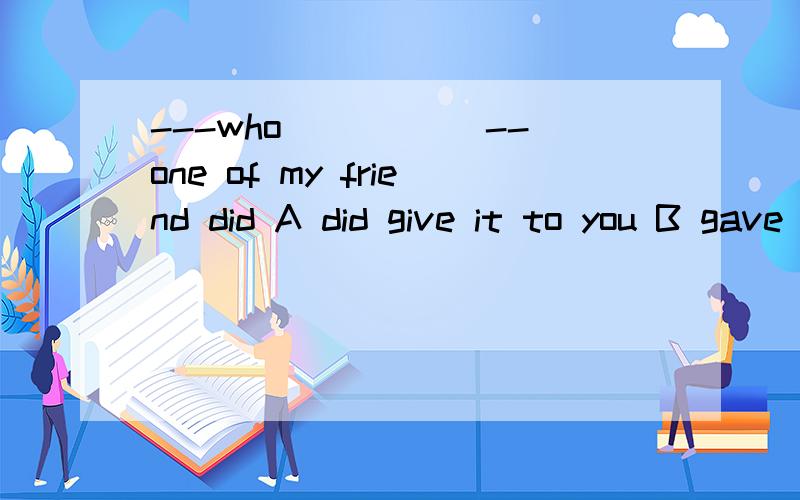---who_____ --one of my friend did A did give it to you B gave it to you答案是第一个,我认为第二个,因为这里who 做的是主语,告诉我到底哪个对,有时候答案总是和想法不同,所以很迷惑
来源:学生作业帮助网 编辑:作业帮 时间:2024/11/06 05:21:53

---who_____ --one of my friend did A did give it to you B gave it to you答案是第一个,我认为第二个,因为这里who 做的是主语,告诉我到底哪个对,有时候答案总是和想法不同,所以很迷惑
---who_____ --one of my friend did A did give it to you B gave it to you
答案是第一个,我认为第二个,因为这里who 做的是主语,告诉我到底哪个对,有时候答案总是和想法不同,所以很迷惑
---who_____ --one of my friend did A did give it to you B gave it to you答案是第一个,我认为第二个,因为这里who 做的是主语,告诉我到底哪个对,有时候答案总是和想法不同,所以很迷惑
呵呵~同学.
因为这里是一般疑问句,所以选A,A才能构成疑问句,而B不行.
根据答案,最后的did知选A。
did 在问题里是表强调,原形为do。强调who这个主语
参考
在不同的语境下,do强调句表达出来的各种语用意义如下:
1. 通过强调来消除对方的怀疑(真的……):
(1)A: Do you love me?
B: I swear it. I do love you.
2. 通过强...
全部展开
根据答案,最后的did知选A。
did 在问题里是表强调,原形为do。强调who这个主语
参考
在不同的语境下,do强调句表达出来的各种语用意义如下:
1. 通过强调来消除对方的怀疑(真的……):
(1)A: Do you love me?
B: I swear it. I do love you.
2. 通过强调以增强反差(相反,……才……呢!):
(2)You always say it doesn’t matter, but it does matter.
(3)He told me he saw a ghost, but I wonder whether he really did believe it himself.
3. 通过强调对某事物作部分认同(倒是真……,说不定真……):
(4)He claimed to be rich and did occasionally have a ten-pound note in his wallet.
(5)Occasionally he did write a letter to his parents, but he was not the good-son type of boy at all.
(6)A: If he had believed you, he would have done something.
B: Well, perhaps he did do something about it.
4. 通过强调,对事物真正(或佯装)表现出惊讶(果然……!):
(7)Oh, Mary, you did find a beautiful present for me.
(8)What, you did win all this money in the lottery?
5. 强调谓语,流露对所表达事物的感情(实在……):
(9)Oh, Jane, you are so sweet. I do love you.
(10)After a long walk with her friend she said: “Oh John, let’s stop here. I do get so breathless.”
(11)I’m sorry, but the way you said that did sound funny.
6. 通过强调并重复来肯定该事物(的确……):
(12)My sister married a crook, but it was a good thing she did marry him, or she would never have found a husband in all her life.
(13)Jack said he would come and he did come.
7. 通过强调表达一种对比:
(14)I want to weep. In fact, I do weep a little.
(15)I don’t have much contact with my family. I do see my mother sometimes, though.
8.在祈使句中,do表强意的请求,而不是命令,有时它可以使邀请对方的心意更加客气、热情、友好,而且亲切,此时的do可译为“务”、“务必”等。例如:
(16)Please do sit down.
(17)Do be careful!
(18)Do tell me all about it. I’ll keep it a dead secret.
(19)Do write to me when you get there.
通过强调手段表达的语用意义当然远不止这些,而且在这些意义之间也不能划一条十分明显的界限,一切还是取决于语境。
收起
A
我觉得是第二个,怎么可能用第一个呢?是不是答案错了,我赞同你的观点,这里who 就是主语,也是疑问词,第一个完全说不通
事实上,现在的美国人说话比较口语化.我敢肯定很多美国人是不会用A那种说法的,虽然从语法上来说这种说法才是对的.如果看美国片多了,会发现他们在说这种问句时很多时候都用陈述句的方式,只是像中国人一样加上问话的语气而已.